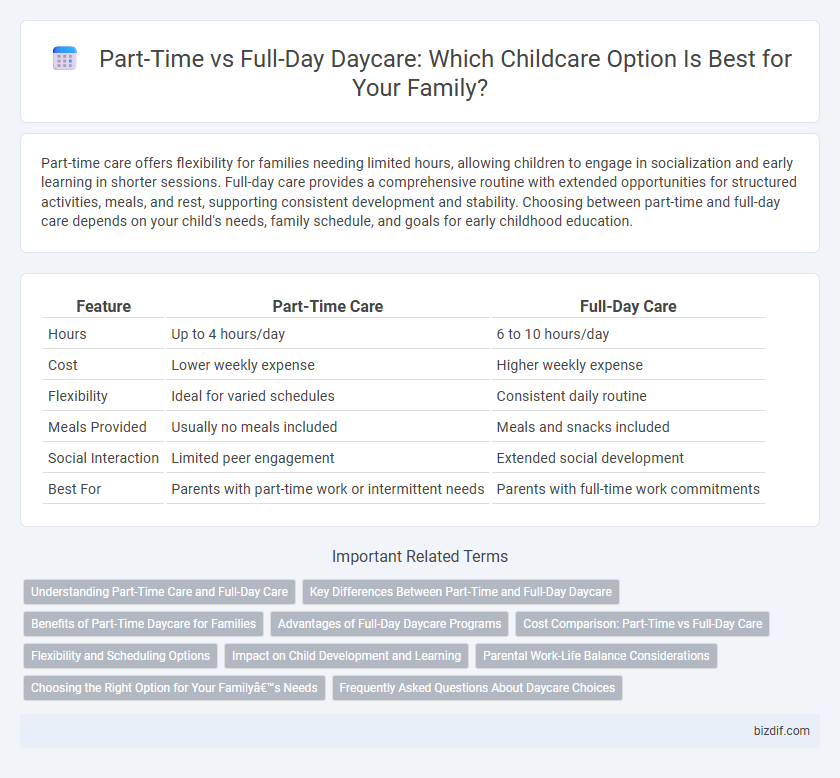Part-time care offers flexibility for families needing limited hours, allowing children to engage in socialization and early learning in shorter sessions. Full-day care provides a comprehensive routine with extended opportunities for structured activities, meals, and rest, supporting consistent development and stability. Choosing between part-time and full-day care depends on your child's needs, family schedule, and goals for early childhood education.
Table of Comparison
| Feature | Part-Time Care | Full-Day Care |
|---|---|---|
| Hours | Up to 4 hours/day | 6 to 10 hours/day |
| Cost | Lower weekly expense | Higher weekly expense |
| Flexibility | Ideal for varied schedules | Consistent daily routine |
| Meals Provided | Usually no meals included | Meals and snacks included |
| Social Interaction | Limited peer engagement | Extended social development |
| Best For | Parents with part-time work or intermittent needs | Parents with full-time work commitments |
Understanding Part-Time Care and Full-Day Care
Part-time care offers flexible hours typically ranging from a few mornings or afternoons per week, allowing parents to balance work or other commitments while providing essential early childhood socialization and learning experiences. Full-day care usually spans 8 to 10 hours, supporting parents with a full workday by delivering structured educational activities, meals, and extended supervision in a safe environment. Choosing between part-time and full-day care depends on family schedules, budget considerations, and the child's developmental needs.
Key Differences Between Part-Time and Full-Day Daycare
Part-time daycare offers flexible hours, typically ranging from a few hours to half a day, catering to families with varying schedules or those seeking occasional care. Full-day daycare provides comprehensive care, often aligning with standard work hours, promoting consistent routines and social development for children. Cost structures also differ, with part-time care generally costing less overall but potentially higher per hour compared to the fixed daily rates of full-day programs.
Benefits of Part-Time Daycare for Families
Part-time daycare offers families flexible scheduling options that accommodate work commitments and personal obligations, reducing childcare costs compared to full-day care. It supports children's social development through structured interaction while allowing more family bonding time. This balanced approach helps ease transitions into longer care hours, promoting emotional well-being and adaptability in young children.
Advantages of Full-Day Daycare Programs
Full-day daycare programs provide consistent routines that support children's emotional stability and cognitive development through extended learning and socialization opportunities. These programs often include structured activities, nutritious meals, and adequate rest periods, fostering overall well-being and growth. Parents benefit from reliable scheduling that aligns with standard work hours, reducing stress and enhancing family work-life balance.
Cost Comparison: Part-Time vs Full-Day Care
Part-time daycare typically costs less than full-day care, making it a more budget-friendly option for families with flexible schedules or fewer childcare hours needed. Full-day care offers comprehensive coverage but often comes with higher fees, reflecting the extended hours and additional resources required. Comparing hourly rates reveals part-time care can reduce expenses significantly, especially for parents seeking occasional support rather than full-time supervision.
Flexibility and Scheduling Options
Part-time daycare offers flexible scheduling options that accommodate parents with irregular or limited work hours, allowing children to attend only on selected days or for shorter periods. Full-day care provides consistent, structured routines that benefit families requiring reliable, all-day childcare from morning until evening. Choosing between part-time and full-day care depends on balancing flexibility needs with the desire for stable, predictable schedules.
Impact on Child Development and Learning
Part-time care fosters stronger parent-child bonds through increased home interaction, supporting emotional security and early learning development. Full-day care offers extended socialization opportunities and structured educational activities, enhancing cognitive skills and adaptability in diverse environments. Selecting the appropriate care model depends on the child's developmental needs and family preferences for balanced growth and learning outcomes.
Parental Work-Life Balance Considerations
Part-time care offers greater flexibility for parents managing varying work schedules, allowing them to balance professional responsibilities with quality time at home. Full-day care provides consistent, structured support ideal for parents with traditional or demanding 9-to-5 jobs, ensuring uninterrupted work hours. Choosing between part-time and full-day daycare impacts parents' ability to maintain work-life balance by aligning childcare arrangements with their specific employment demands and personal preferences.
Choosing the Right Option for Your Family’s Needs
Part-time daycare offers flexible hours ideal for families needing occasional child supervision, while full-day care provides structured routines supporting working parents with consistent schedules. Evaluating your family's work commitments, child's social and developmental needs, and budget constraints ensures the best fit between part-time and full-day options. Prioritize quality of care, caregiver-to-child ratios, and program curriculum to match your family's unique requirements.
Frequently Asked Questions About Daycare Choices
Part-time care offers flexible scheduling options ideal for parents needing limited hours, while full-day care provides comprehensive supervision from morning till late afternoon, supporting full workdays. Cost differences are significant, with part-time care generally being more affordable than full-day obligations, though availability varies by facility and region. Parents often inquire about socialization opportunities, meal provisions, and curriculum intensity, with full-day programs typically offering structured activities and meals included.
Part-Time Care vs Full-Day Care Infographic

 bizdif.com
bizdif.com